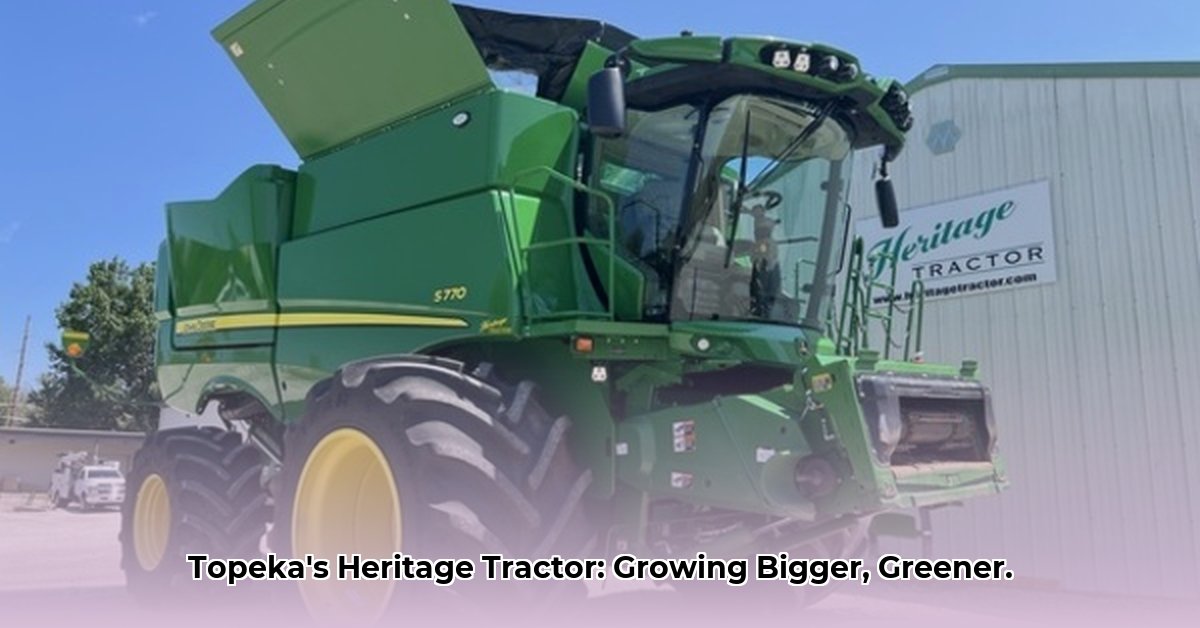
Heritage Tractor Inc. is aggressively expanding its presence in Topeka, Kansas, adding 22 new locations. This growth demonstrates market success and a commitment to customer service. However, the company's stance on sustainable agriculture practices remains unclear, raising questions about its long-term commitment to environmental responsibility. For more information on their Nevada, MO location, see Heritage Tractor Nevada.
A Significant Expansion, Yet Sustainability Questions Persist
Heritage Tractor's rapid expansion—22 new locations—suggests strong market performance and a commitment to providing convenient access to agricultural equipment for local farmers. This growth is likely to stimulate the regional economy, creating jobs and boosting related industries. But this positive trajectory is tempered by a noticeable absence of public messaging regarding environmentally friendly practices. This lack of transparency raises concerns about whether Heritage Tractor is adequately addressing the growing demand for sustainable agricultural solutions. Does this rapid expansion overshadow a crucial commitment to environmental stewardship?
Customer-Focused Strategies: A Foundation, but Not Enough
Heritage Tractor employs various strategies to cultivate customer loyalty, including seasonal sales and promotions on essential parts like oil and filters. This customer-centric approach is vital for long-term success in a competitive market. However, this focus on customer service needs to be complemented by a demonstrable commitment to sustainability. Failing to address environmental concerns risks alienating environmentally conscious customers and potentially hindering future growth in an increasingly sustainability-focused market. How will Heritage Tractor balance its commitment to customer satisfaction with the urgency of climate-conscious practices?
Equipment Portfolio: A Blend of Traditional and Modern Approaches
Heritage Tractor offers a wide range of equipment, including both traditional and modern machinery suitable for various farming operations. While this diversified portfolio caters to a broad customer base, a critical element is missing: a clear commitment to promoting fuel-efficient models and precision farming technologies. These technologies are essential for reducing environmental impact and optimizing resource utilization. The absence of prominent messaging about sustainable equipment options within their marketing raises concerns. Is Heritage Tractor missing an opportunity to attract environmentally-conscious farmers by not explicitly highlighting its sustainable equipment offerings?
The Silence on Sustainability: A Missed Opportunity?
The lack of clear communication regarding Heritage Tractor's sustainability initiatives is perplexing. This omission in their marketing and public relations efforts is a significant concern. Does this silence reflect a genuine lack of commitment to sustainable practices, or is it a strategic oversight that could damage their brand reputation? The company’s reticence to publicly address its sustainability efforts risks creating a perception of indifference towards important environmental issues, potentially pushing away environmentally-conscious customers and investors. Will this silence ultimately hinder Heritage Tractor's long-term growth and competitiveness?
Actionable Steps for Stakeholders
Various stakeholders can contribute to addressing this sustainability gap:
Heritage Tractor: Publicly commit to specific sustainable agriculture initiatives, invest in sustainable equipment, and implement employee training programs; engage in transparent communication with customers about their efforts. This proactive transparency would be highly effective.
Farmers/Customers: Inquire directly about Heritage Tractor's sustainability initiatives; actively seek out businesses committed to environmentally responsible agriculture. Active participation drives change.
Suppliers: Prioritize sustainable manufacturing practices; actively develop and invest in sustainable supply chains. Sustainable practices throughout the value chain are essential.
Government Agencies: Offer financial incentives for adopting sustainable agricultural technologies and practices; enact policies promoting environmentally friendly farming. Policy intervention can drive sustainable adoption.
Potential Risks: Navigating the Sustainability Landscape
Heritage Tractor faces significant risks by failing to address sustainability concerns:
Market shifts: The increasing demand for sustainable products may lead to decreased market share.
Regulatory changes: New environmental regulations could negatively impact operations.
Reputational damage: A lack of transparency regarding sustainability initiatives could damage the company's image.
These risks can be mitigated through proactive engagement with sustainable practices, transparent communication, and a commitment to long-term environmental responsibility.
Conclusion: A Call for Transparency
Heritage Tractor's expansion represents a significant achievement. However, its lack of clarity regarding sustainable agriculture practices presents a notable challenge. The company's long-term success depends on addressing this issue transparently and committing to sustainable practices. Ignoring this critical aspect risks undermining the positive impacts of its expansion and compromising its future viability in an increasingly environmentally conscious world. Transparency and action are key to building a sustainable future for Heritage Tractor.